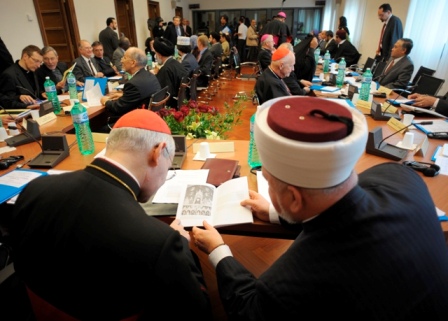

By: TheNational.ae
Source: TheNational.ae
CAIRO // Senior Muslim clerics in Egypt believe Pope Benedict XVI’s abrupt resignation could reopen the way for dialogue with the Roman Catholic Church, severed after the Pope’s controversial 2006 remarks on the Muslim prophet.
But improved ties between the church and Al Azhar, the premier seat of Sunni Muslim learning, would depend on the next pope’s approach to the Muslim world, the clerics said.
“The resumption of ties with the Vatican hinges on the new atmosphere created by the new pope,” said Mahmud Azab, an adviser on interfaith for the head of Al Azhar Ahmed Al Tayyeb.
“The initiative is now in the Vatican’s hands,” he said.
In 2006, Pope Benedict sparked fury across the Muslim world when he recounted an anecdote in which the Muslim Prophet Mohammed was described as a warmonger who spread evil teachings by the sword.
Dialogue resumed in 2009, but was again severed after the pope strongly called for protection of Christian minorities following a January 2011 suicide bombing at a church in Alexandria, Egypt’s second city.
At the time, Al Azhar said it would cut ties again with the Vatican over what it called Pope Benedict’s “repeated treatment of Islam in a negative way, and his claims that Christians and others are oppressed in the Middle East.”
Yusef Al Qaradawi, a senior cleric in Al Azhar, said his International Union of Islamic Scholars organisation had boycotted Pope Benedict since his 2006 comments.
“Now, God has willed that we resume dialogue, after a new pope is elected,” he said, adding he was “optimistic.”
Such a dialogue, however, would take place as Islamists take centre stage in several Middle Eastern countries, after the Arab uprisings of 2011, further complicating relations with Christian minorities.
Pragmatic groups such as Egypt’s Muslim Brotherhood rulers are likely to welcome dialogue, said Ashraf Al Sherif, a political-science professor at the American University in Cairo.
“Parties with an Islamic reference such as the (Brotherhood’s) Freedom and Justice Party may welcome dialogue, given their desire to present a good image,” he said.
To the right of such parties, however, are ultraconservative Salafi movements who are traditionally less open to interfaith talks, but Mr Al Sharif said they might also have no objections because “the dialogue is essentially a formality.”
“Generally, Islamists will not have a negative impact on the chances for a dialogue,” he said.
Al Azhar and the Vatican had held continuing dialogues on coexistence under Pope John Paul II, Benedict’s predecessor.
A resumption of dialogue should be based on the firmer grounds of an institutional relationship, rather than personal ties, said Hassan Wagih, a professor of political science at Al Azhar University.
“The danger is in reducing the relationship to a personal one; it must be an institutional relationship,” he said.
The new pope, he added, would have to tackle problems between the Vatican and Muslims and “push for mutual respect.”
Following his 2006 comments, which sparked protests in Muslim countries, Pope Benedict tried to mend fences with a visit to the Sultan Ahmed Mosque in Istanbul, the second visit by a pope to a mosque in papal history.
“The new pope must not attack Islam,” said a senior Al Azhar cleric, Mahmoud Ashour, adding that relations with the Vatican should be based on the principle that religions “complete one another, rather than compete.”



